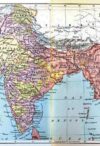
February 2021 (Volume 72, Number 8)
We remember our good friend and comrade, Leo Panitch, one of the great socialist intellectuals of all time, who died on December 19, 2020, age 75. | more…

We remember our good friend and comrade, Leo Panitch, one of the great socialist intellectuals of all time, who died on December 19, 2020, age 75. | more…

The Western European powers appropriated economic surplus from their colonies, materially and substantially aiding their own industrial transition from the eighteenth century onward, as well as the diffusion of capitalism to the regions of new European settlement. In the case of India, the concept of drain is based on the fact that a substantial part of its earnings was never permitted to accrue to the country; it was instead appropriated by the ruling power: Britain. | more…

With the advent of COVID-19, India’s rulers imposed the world’s most stringent lockdown on an already depressed economy, dealing a body blow to the majority of India’s billion-plus population. Yet the Indian government’s spending to cushion the lockdown’s economic impact ranked among the world’s lowest in GDP terms, resulting in unprecedented unemployment and hardship. Crisis and Predation shows how this tight-fistedness stems from the fact that global financial interests oppose any sizable expansion of public spending by India, and that Indian rulers readily adhere to their guidance. Meanwhile, under the banner of reviving private investment, India’s rulers have planned giant privatizations, and drastically revised laws concerning industrial labor, the peasantry, and the environment—in favor of large capital. | more…

Since the emergence of COVID-19, the United States has quite openly decided to use the crisis, at a global scale, as a weapon against its perceived rival, China. In this context, India has taken a number of steps to restructure its relation to China, asserting economic stances and implementing policies that are becoming more and more closely entwined with its geopolitical positions and aspirations. | more…

Although the 1967 revolutionary armed peasant uprising in Naxalbari, at the foot of the Indian Himalayas, was brutally crushed, the insurgency gained new life elsewhere in India. In fact, this revolt has turned out to be the world’s longest-running “people’s war,” and Naxalbari has come to stand for the road to revolution in India. What has gone into the making of this protracted Maoist resistance? Bernard D’Mello’s fascinating narrative answers this question by tracing the circumstances that gave rise to India’s “1968” decade of revolutionary humanism and those that led to the triumph of the “1989” era of appallingly unequal growth condoned by Hindutva-nationalism, the Indian variant of Nazism. | more…

Neoliberal development has opened the eastern Indian state of Odisha to mining companies and steel conglomerates, threatening the region’s ancient subsistence economies and provoking a fierce resistance, in which women have taken a leading role. | more…
The overarching goal of this article is to explain how the relations between capitalist imperialism, primary accumulation—often misleadingly called “primitive accumulation”—and intersectionality operate in contemporary global political economy. From many recent studies, it is clear that certain populations are more vulnerable to processes of primary accumulation than others, and that many people in the global South now experience the dispossession and displacement caused by primary accumulation without any subsequent incorporation into waged work. Understanding how ethnicity, gender, and class intersect within contemporary patterns of global accumulation is important in order to develop clear political strategies against ongoing dispossessions.… To do so, imperialism, primary accumulation, and intersectionality all need to be rethought, especially in relation to each other. | more…
The “thirty-year crisis” of capitalism, which encompassed two world wars and the Great Depression, was followed by a period that some economists call the Golden Age of capitalism. Today, however, capitalism is once again enmeshed in a crisis that portends far-reaching consequences. I am not referring here to the mere phenomenon of the generally slower average growth that has marked the system since the mid-1970s. Rather, I am talking specifically of the crisis that started with the collapse of the U.S. housing bubble in 2007-8 and which, far from abating, is only becoming more pronounced.… The Western media often give the impression that the capitalist world is slowly emerging from this crisis. Since the Eurozone continues to be mired in stagnation, this impression derives entirely from the experience of the United States, where there has been talk of raising the interest rate on the grounds that the crisis is over, and inflation is now the new threat.… To claim…that the United States is experiencing a full recovery is, in terms of working class well-being and economic security, wrong. And if we consider the rest of the world, especially recent developments in the “emerging economies,” the situation is much worse. | more…
Capitalism is preeminently a money-using system where a large part of wealth is held either in the form of money or as money-denominated assets, namely financial assets. For the system to work, it is essential that the value of money should not keep declining against commodities; otherwise people would move away from holding money, and it would cease to be not just a form of wealth, but even a medium of circulation.… Hence, capitalism seeks to ensure the stability of the value of money in a number of ways. One is the maintenance of a vast reserve army of labor, not just within the metropolis but also in the third world. | more…
Insofar as imperialism is about the struggle over and capture of economic territory (which must be broadly defined to include not just geographical territory such as land and natural resources, but also the creation of new markets, sources of labor, and forms of surplus transfer such as are reflected in intellectual property), these changes [in imperialism since the early 20th century] have created distant demands upon imperialist structures and processes…. [So] how can capital (which is increasingly global in orientation) generate the superstructures through which the transfers of value are ensured and the investment risks are moderated and contained? It will be argued that there has been an endeavor to resolve this by refashioning the global institutional architecture in ways that operate to increase the conditions of “stability” for large capital while increasing its bargaining power vis-à-vis working people and citizens, as well as nation-states and even smaller capitalist enterprises. | more…
After the Snowden revelations, Internet governance has emerged from relative obscurity, involving only a small technical community, to occupy the center stage of human rights discourse and international relations.… Everyone agrees that digital technologies, including the Internet, are transformative technologies. They reorder society as a whole, as well as relations between society and individuals. But…[their] potential…has not been fully realized. A case in point: instead of the democratizing potential of the Internet, a few global corporations have created monopolies that are much bigger than those we have seen before, and this has happened in just two decades. What does this mean, for instance, for the plurality of media voices? We know that Internet advertising revenue in the United States, having previously overtaken the print media, has now overtaken even TV network advertising revenues. How did monopolies on such a scale happen, and happen so quickly? Does it have to do with the nature of the Internet? Or its architecture and governance? | more…
Social inequalities and exclusions can devastate people’s lives, especially when they are far from the centers of power and control. This wreckage can be seen in many different parts of their lives, but particularly in their health. The health of any given country’s population is primarily determined by politics, and public policies play a critical role. All over the world, countries with a history of egalitarian ideologies, and corresponding policies aimed at reducing social inequalities, have healthier populations. The Indian state of Kerala, which has a long-running radical political tradition and a history of social-reform movements in the early twentieth century, is acclaimed for its achievements in health and social-sector development, including low levels of mortality and fertility, and high levels of life expectancy and literacy—all despite its low-performing economy. Kerala has become a veritable mecca for other low-income nations in social development and health advancement. | more…
Notifications